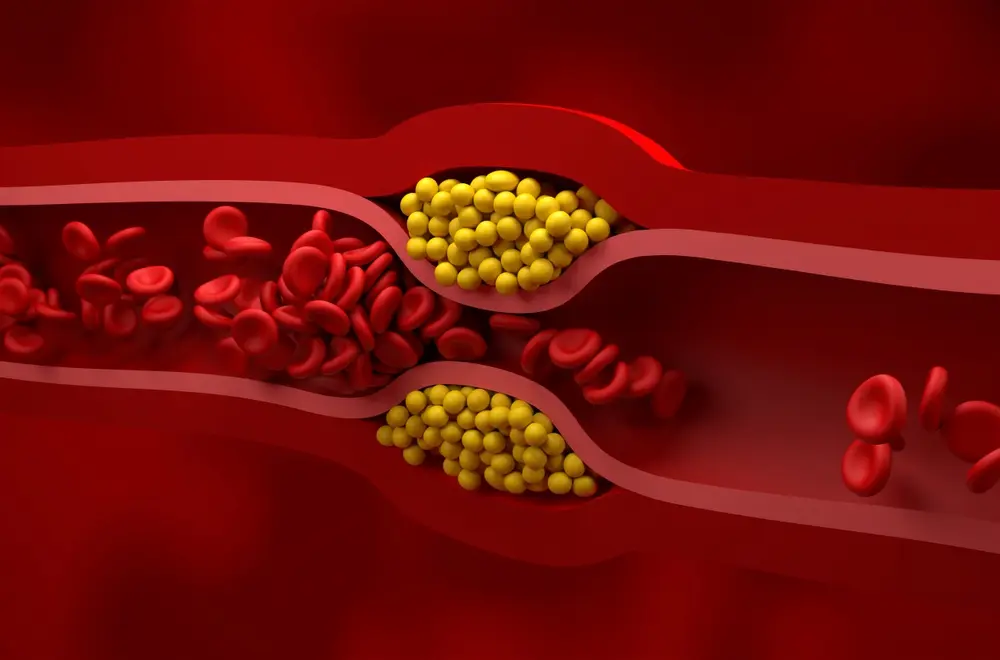
Triglycerides are a type of fat found in your blood, and they come from the foods you eat—especially those high in sugars and carbohydrates. Triglycerides are important because they give you energy and allow you to function properly. They also help insulate the body and protect vital organs. However, when triglyceride levels rise above 150 mg/dL, they can cause problems. High levels of triglycerides are often linked to atherosclerosis, where fatty deposits build up in your arteries. This buildup narrows the arteries and makes it harder for blood to flow.
Over time, this can set the stage for serious heart issues, including coronary heart disease, heart attack and stroke. Elevated triglycerides can also increase your risk of other cardiovascular diseases, especially if you have high LDL cholesterol (the bad cholesterol) or low HDL cholesterol (the good cholesterol).
The good news is there are practical steps to lower triglyceride levels and protect your heart and we’ll cover those in this article.
Triglycerides are a type of fat (called lipids) that are often associated with an increased risk of cardiovascular diseases. When you eat more calories than you burn, particularly from foods high in carbohydrates, you may have a condition called hypertriglyceridemia (high triglycerides). And if you don’t get treatment, this may cause harm to your blood vessels and heart.

Normal triglyceride levels are less than 150mg/dL or less than 1.7 mmol/L. Your provider will perform a simple blood test to determine whether your levels fall into a healthy range. This test is part of a cholesterol test, which is often referred to as a lipid profile or lipid panel.
Ideally, your triglycerides should be in the normal range. If your levels are borderline high or higher, it might be a good idea to consider some lifestyle changes or talk with your doctor about what you can do next.
Regular check-ups will help you monitor your levels and take proactive steps to keep your heart healthy. This is crucial, considering you’re 25% more likely to die from heart problems when you have triglycerides above 200 mg/dL compared to someone in a normal range.
High triglycerides can greatly impact your health, especially your heart. But that’s not all. High triglycerides are often a sign of other health conditions that can elevate your risk for heart problems.
For example, they’re commonly associated with obesity and metabolic syndrome—a group of conditions that includes abnormal cholesterol levels, excess abdominal fat, high blood pressure, and high blood sugar.
Elevated triglycerides can also indicate:
Several factors can lead to high triglyceride levels. Here are some common causes:
High triglycerides often don’t show noticeable symptoms, which makes them tricky. However, extremely high levels can cause pancreatitis, leading to severe abdominal pain. It’s essential to have regular check-ups and blood tests to monitor your levels.

A lot of exciting research is happening right now that could change how doctors treat high triglycerides. Scientists are working on new medications and therapies that might be more effective and have fewer side effects than the treatments available today. This means better options for managing triglycerides and protecting your heart in the future.
If you're interested, joining a clinical trial could give you access to these advanced treatments while helping researchers learn more about heart health. Organizations like Science 37 are conducting studies on heart disease, including high triglycerides, to discover better ways to treat and prevent these conditions.
The more we learn from ongoing research, the closer we are to finding the best ways to manage high triglycerides and keep your heart healthy. So, there’s real hope on the horizon for more effective care.


